

The Basics of Stress. Stress is a situation that triggers a particular biological response.
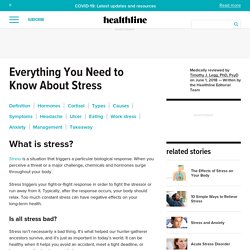
When you perceive a threat or a major challenge, chemicals and hormones surge throughout your body. Stress triggers your fight-or-flight response in order to fight the stressor or run away from it. Typically, after the response occurs, your body should relax. Too much constant stress can have negative effects on your long-term health. Is all stress bad? 5 Things You Should Know About Stress. Stress: Why does it happen and how can we manage it? Stress is a natural feeling of not being able to cope with specific demands and events.
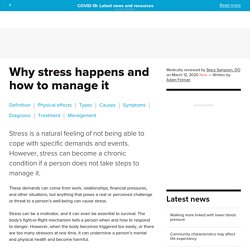
However, stress can become a chronic condition if a person does not take steps to manage it. These demands can come from work, relationships, financial pressures, and other situations, but anything that poses a real or perceived challenge or threat to a person’s well-being can cause stress. Stress can be a motivator, and it can even be essential to survival. The body’s fight-or-flight mechanism tells a person when and how to respond to danger. Signs of stress. Like most websites, we use cookies.

If this is okay with you, please close this message. read more about your options. If this is okay with you, please close this message. If not, please read more about your options. 11 Signs and Symptoms of Too Much Stress. Stress is defined as a state of mental or emotional strain caused by adverse circumstances.

At one point or another, most people deal with feelings of stress. In fact, one study found that 33% of adults reported experiencing high levels of perceived stress (). The condition is associated with a long list of physical and mental symptoms. This article will look at 11 common signs and symptoms of stress. 7 Emotional Symptoms of Stress.
Stress, defined as emotional tension or mental strain, is all too common of a feeling for many of us.
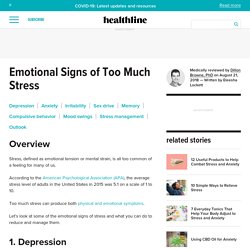
According to the American Psychological Association (APA), the average stress level of adults in the United States in 2015 was 5.1 on a scale of 1 to 10. Too much stress can produce both physical and emotional symptoms. Let’s look at some of the emotional signs of stress and what you can do to reduce and manage them. The Anxiety and Depression Association of America (ADAA) defines depression as an illness in which an individual experiences a persistent and severe low mood. Chronic Stress. Short-lived feelings of stress are a regular part of daily life.

When these feelings become chronic, or long-lasting, they can severely impact a person’s health. In this article, we look at what chronic stress is, how to identify it, and the medical consequences it can have. We also describe ways to manage stress, including medical treatments, and when to see a doctor. Warning Signs of Emotional Stress. Psychological Stress. Stress.

It’s a four-letter word that many of us dread. Whether it’s a tense interaction with a boss or pressure from friends and family, we all face stressful situations from time to time. For some of us, these events happen sporadically. Physical Dangers of Stress. Stress leaches health out of your body, and, if not adequately mitigated, this stress can eventually lead to anxiety.
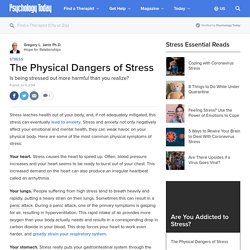
Stress and anxiety not only negatively affect your emotional and mental health, they can weak havoc on your physical body. Here are some of the most common physical symptoms of stress: Your heart. Stress causes the heart to speed up. How to Identify and Reduce Stress in Your Life (+Checklist) Stress is a part of daily life and is only becoming more of a presence in this increasingly-connected world.
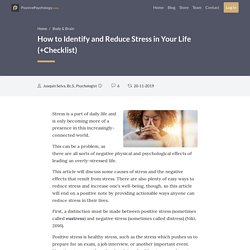
This can be a problem, as there are all sorts of negative physical and psychological effects of leading an overly-stressed life. This article will discuss some causes of stress and the negative effects that result from stress. There are also plenty of easy ways to reduce stress and increase one’s well-being, though, so this article will end on a positive note by providing actionable ways anyone can reduce stress in their lives.
17 Science-Backed Ways to Relieve Stress Right Now! Stress Management Strategies: Ways to Unwind. 62 Stress Management Techniques, Strategies & Activities. What happens when we continue “burning the candle at both ends” until we reach physical and emotional exhaustion?
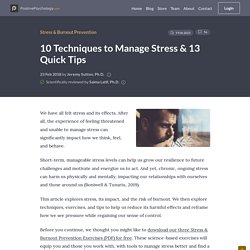
Just like the candle itself, we risk burning ourselves out. There is a parable of a frog sitting in a pot on the stove. If dropped into a pot of boiling water, a frog would likely notice and try to escape. But when placed in a pot that is slowly approaching a boil, the frog doesn’t notice until the water has already reached an unbearable heat—at which point it is too hot for the frog to survive. Have you ever experienced a slow acceptance of the pressures around you, until everything is “just too much” and you can barely cope? Dr. Oz and Karl Romain Demonstrate Stress-Relieving Qigong Exercises.
Breathing Exercises for Stress Relief. A 5 Minutes Japenese Strategy to Relax. How to Help children and Teens Manage their Stress. In the short term, stress can push a child to practice for her piano recital or inspire a teen to study when he’d rather be out with friends. But chronic stress is different. Left unchecked, long-term stress can contribute to a long list of physical and mental health problems. Prolonged stress can cause high blood pressure, weaken the immune system and contribute to diseases such as obesity and heart disease. Stress Relief Tips for Adults. Know the symptoms, get the treatment right for you Stress in adults, especially older adults, has many causes.
You may experience it as a result of managing chronic illness, losing a spouse, being a caregiver, or adjusting to changes due to finances, retirement, or separation from friends and family. Fortunately, there are plenty of things you can do for stress relief. Tailor the treatment The type of stress relief that works best depends on what someone is experiencing.